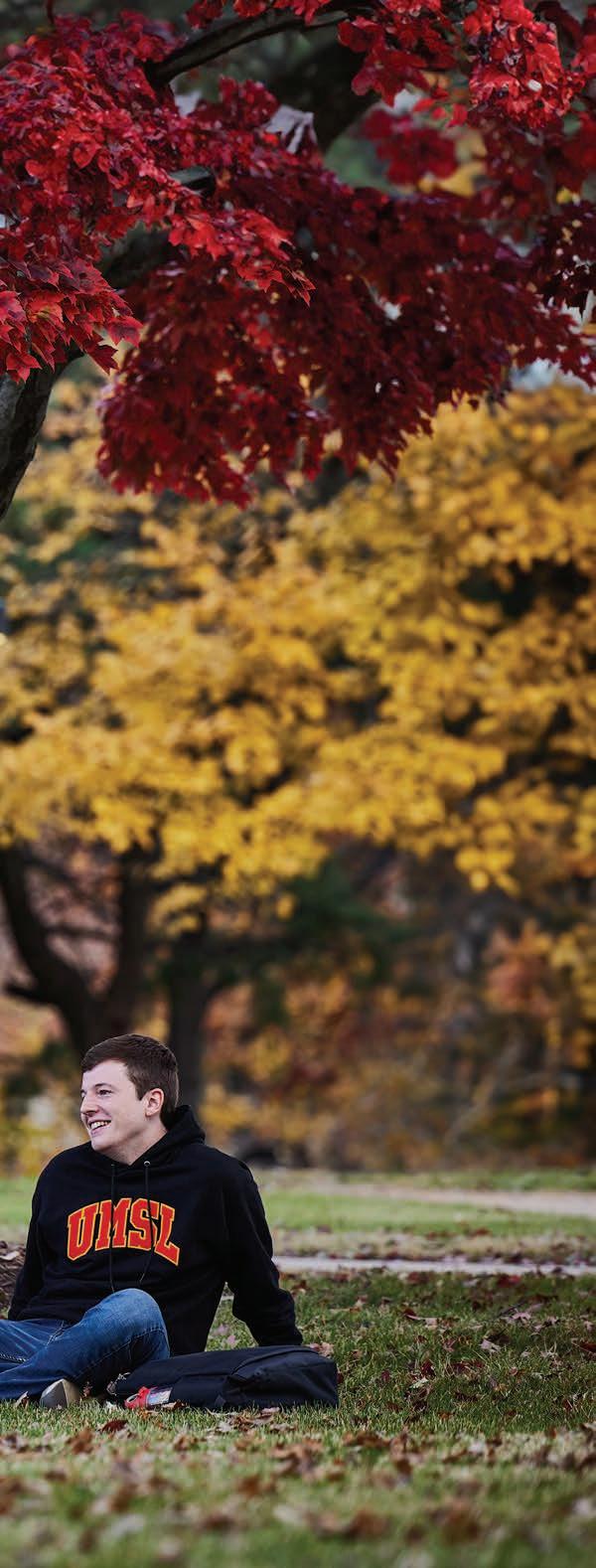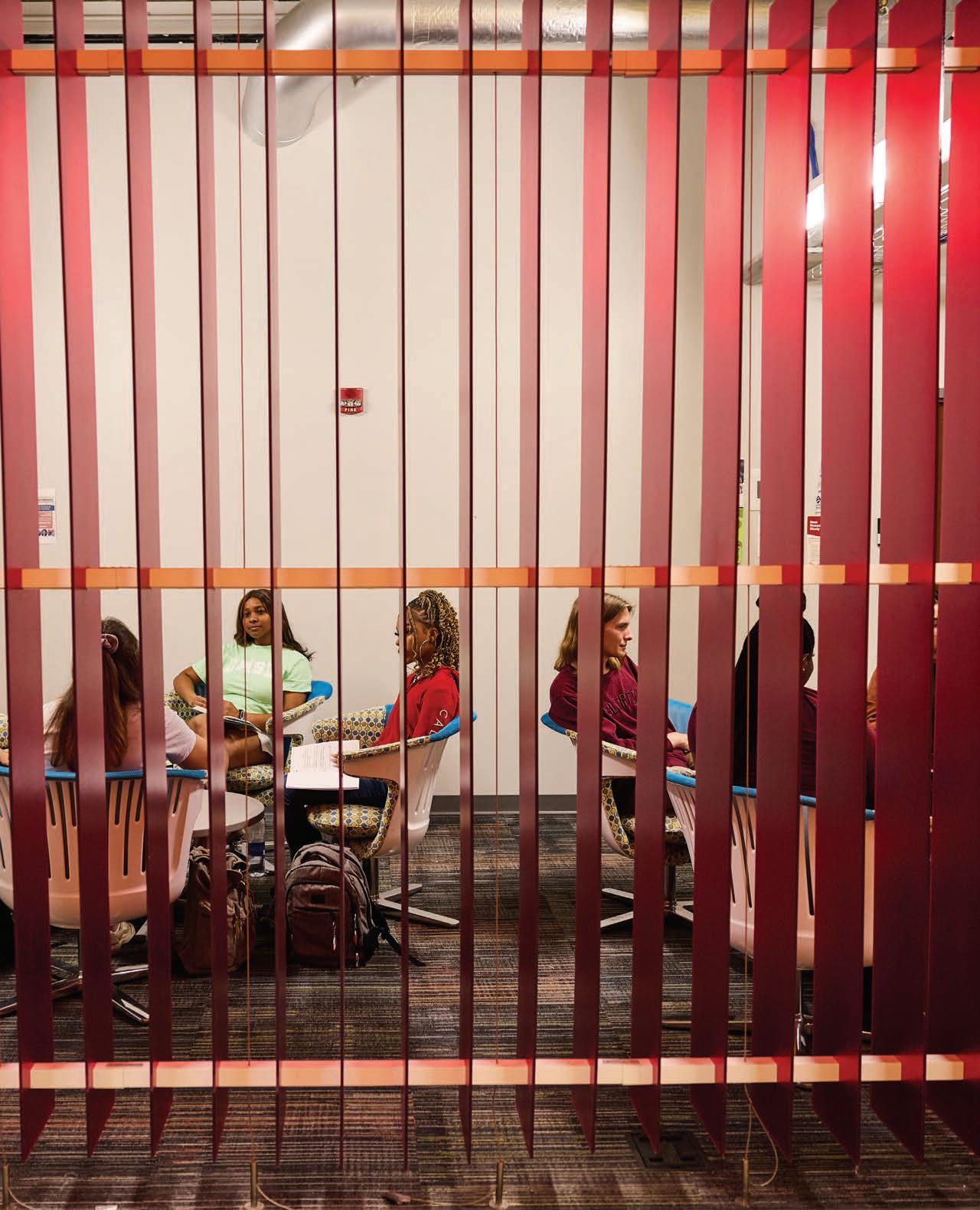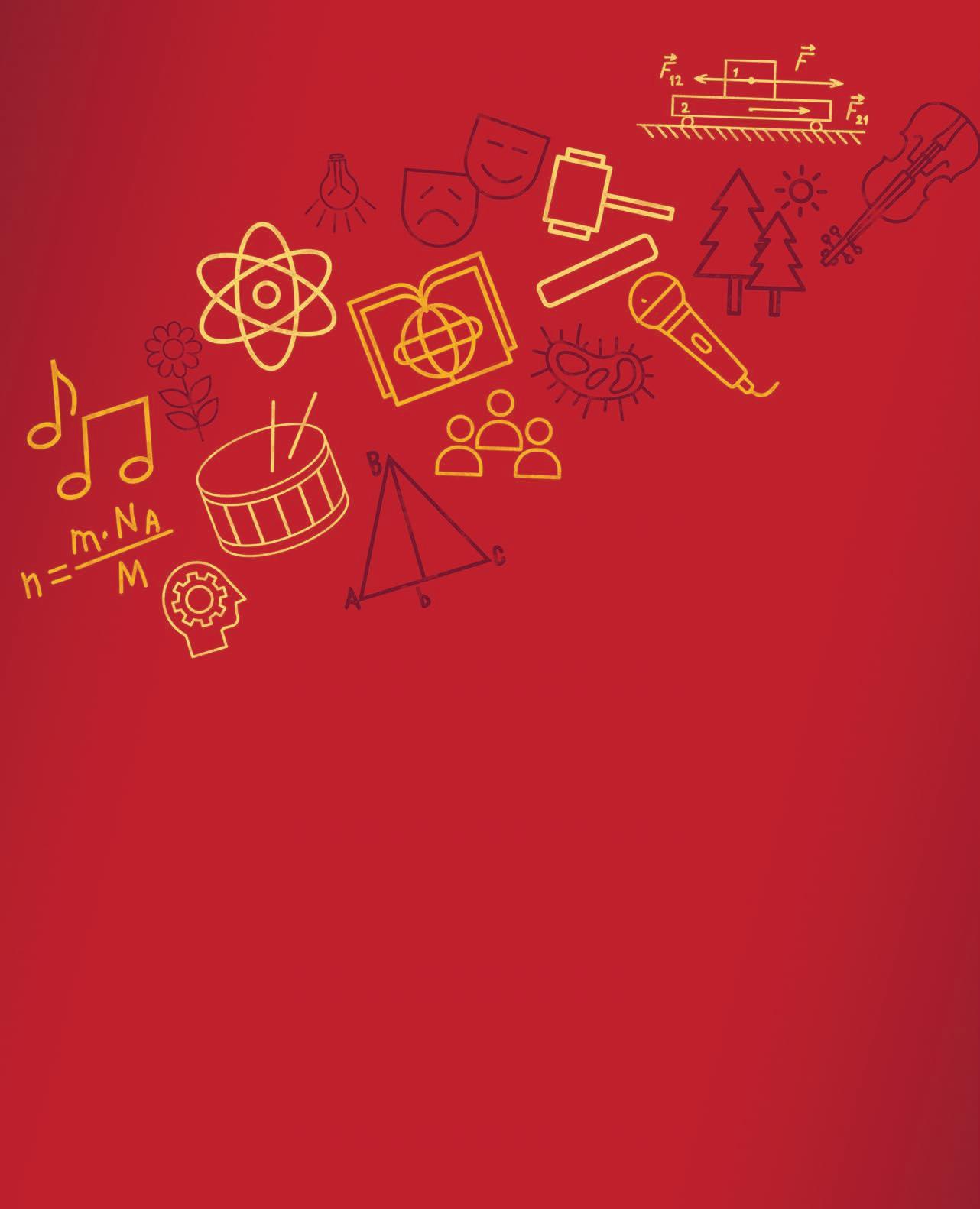

WHERE DISCOVERY BEGINS
— AND TRANSFORMATION TAKES HOLD
STUDENT-CENTRIC
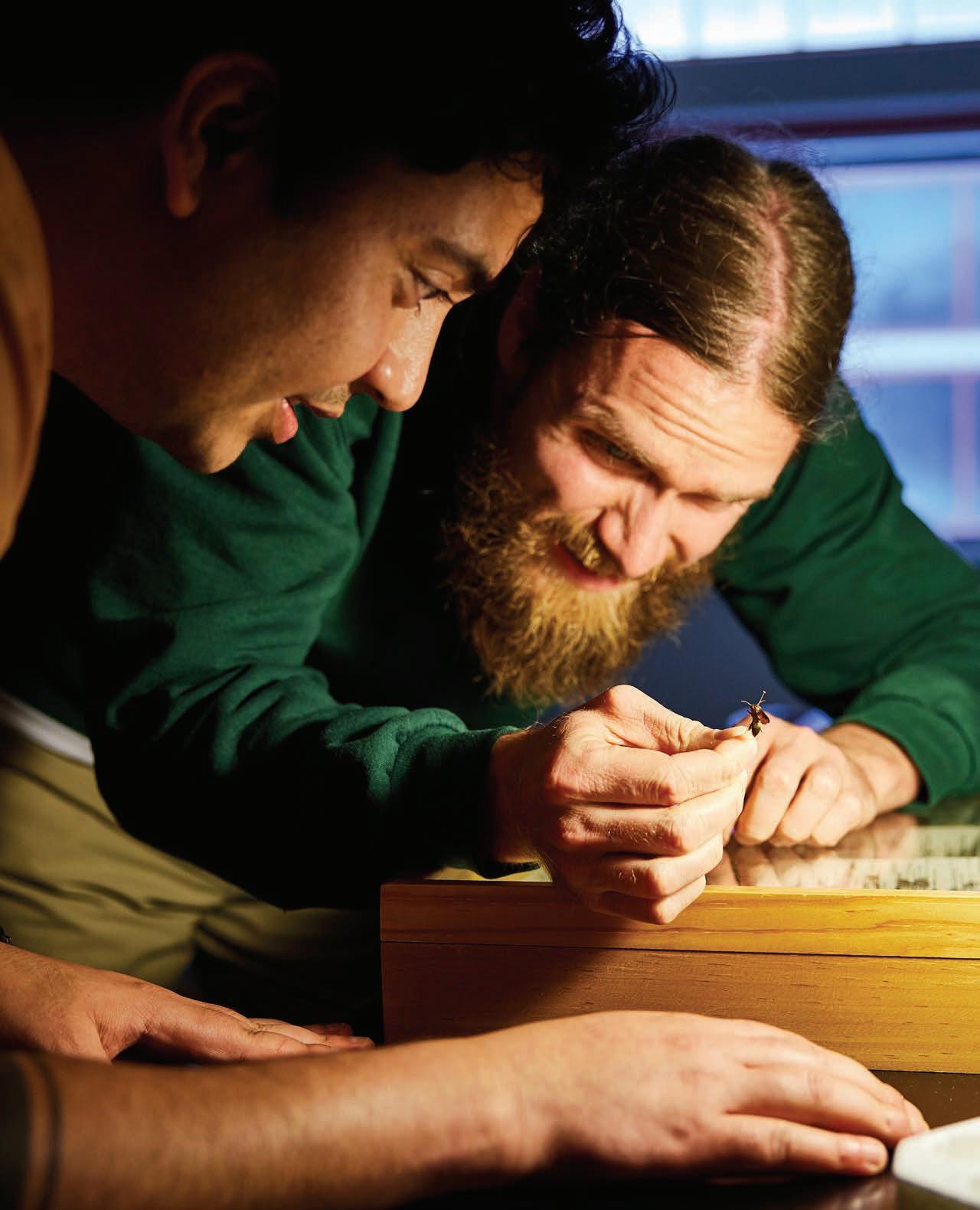
INTERDISCIPLINARY BY DESIGN
COMMUNITY-ENGAGED
As dean of the College of Arts and Sciences at the University of Missouri–St. Louis, I have the privilege of witnessing the transformative power of education in action every single day. CAS is the heart of UMSL. It is the place where most students begin their academic journey and where they grow as thinkers, creators and changemakers.
With more than 3,100 students enrolled across over 70 undergraduate and graduate degree and certificate programs, our college fosters learning that is student-centered, communityengaged and rooted in interdisciplinary collaboration. Our faculty are scholars and mentors who are pushing the boundaries of their fields while remaining deeply committed to teaching and advising. Through small classes, hands-on learning and strong support systems, the College of Arts and Sciences prepares students to thrive in a complex and diverse world.
THE COLLEGE OF ARTS AND SCIENCES AT THE UNIVERSITY OF MISSOURI–ST. LOUIS SITS AT THE HEART OF THE UMSL EXPERIENCE.
We’re proud of our close partnerships across the St. Louis region, which connect classroom learning to real-world application. Whether through internships, policy research, creative work or community-based projects, our students build the networks and experiences that will carry them into meaningful careers and lives of impact.
To current and prospective students: The College of Arts and Sciences offers more than an education; we offer a launchpad for discovery and transformation. To our alumni, supporters and partners: Your continued belief in our mission fuels the student successes we celebrate and the incredible achievements of our community.
I invite you to explore this report and see for yourself the momentum and energy that define the UMSL College of Arts and Sciences.
Sincerely,
Andrew Balkansky, PhD Dean, College of Arts and Sciences
COLLEGE OF ARTS AND SCIENCES
— the academic core
of the University of Missouri–St. Louis
As the metropolitan land-grant research university serving Missouri’s most diverse and economically vital region, UMSL — and the College of Arts and Sciences — provides transformative educational, research and engagement experiences that inform, prepare and inspire.
2024 Faculty Awards
Dr. Jim O’Brien (Chemistry)
Chancellor’s Award for Excellence in Research and Creativity
Dr. Matthew Henry (Music)
Chancellor’s Award for Excellence in Teaching to a Non-Tenure-Track Faculty Member
Dr. Jill Delston (Philosophy)
Chancellor’s Award for Excellence in Teaching to a Tenure/Tenure-Track Faculty Member
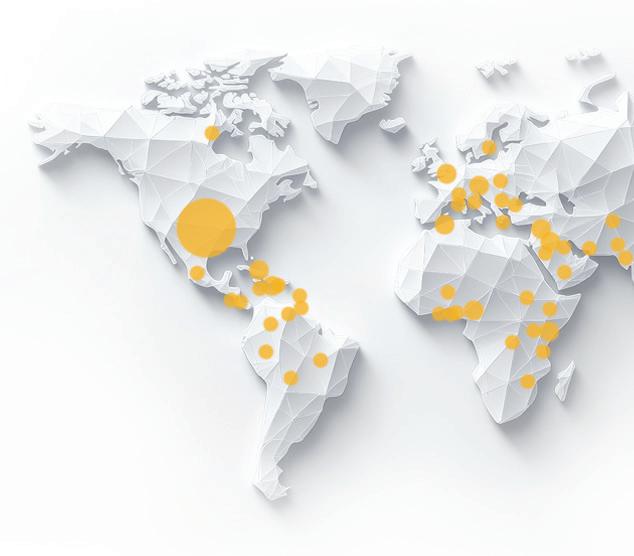
59 Our students come from all around the world countries
94%
UMSL graduates are employed or in graduate school (within six months of graduation)
3,113
Total students in 2024 (not including high school ACP)

First Generation College Students
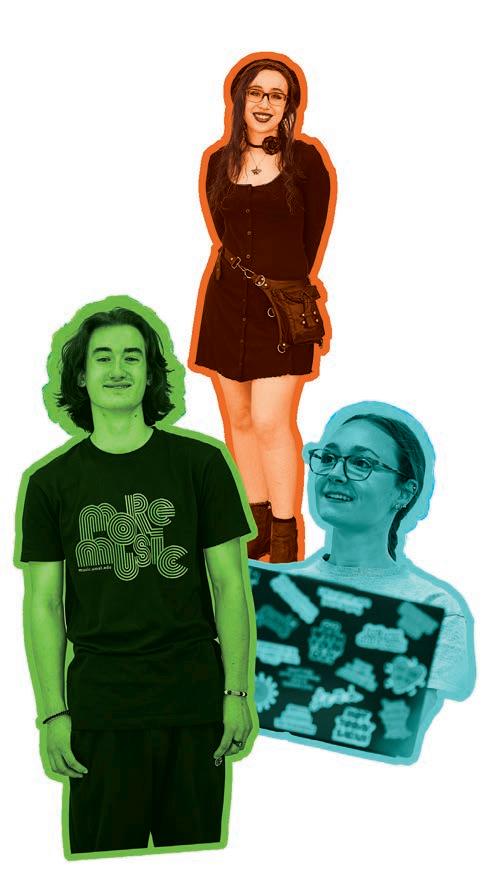
Most Popular Degrees
Bachelor’s Psychology Computer Science Criminology and Criminal Justice Biology Communication
Master’s Computer Science Criminology Psychology History Public Policy Administration
Doctoral Psychology Criminology Math Chemistry Biology
16 Academic Departments
43
Bachelor’s Degrees and Certificates
29
Post-Bachelor’s Degrees and Certificates
867
Degrees and Certificates earned in 2024
WHERE DISCOVERY BEGINS — AND TRANSFORMATION TAKES HOLD
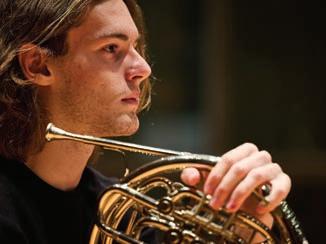
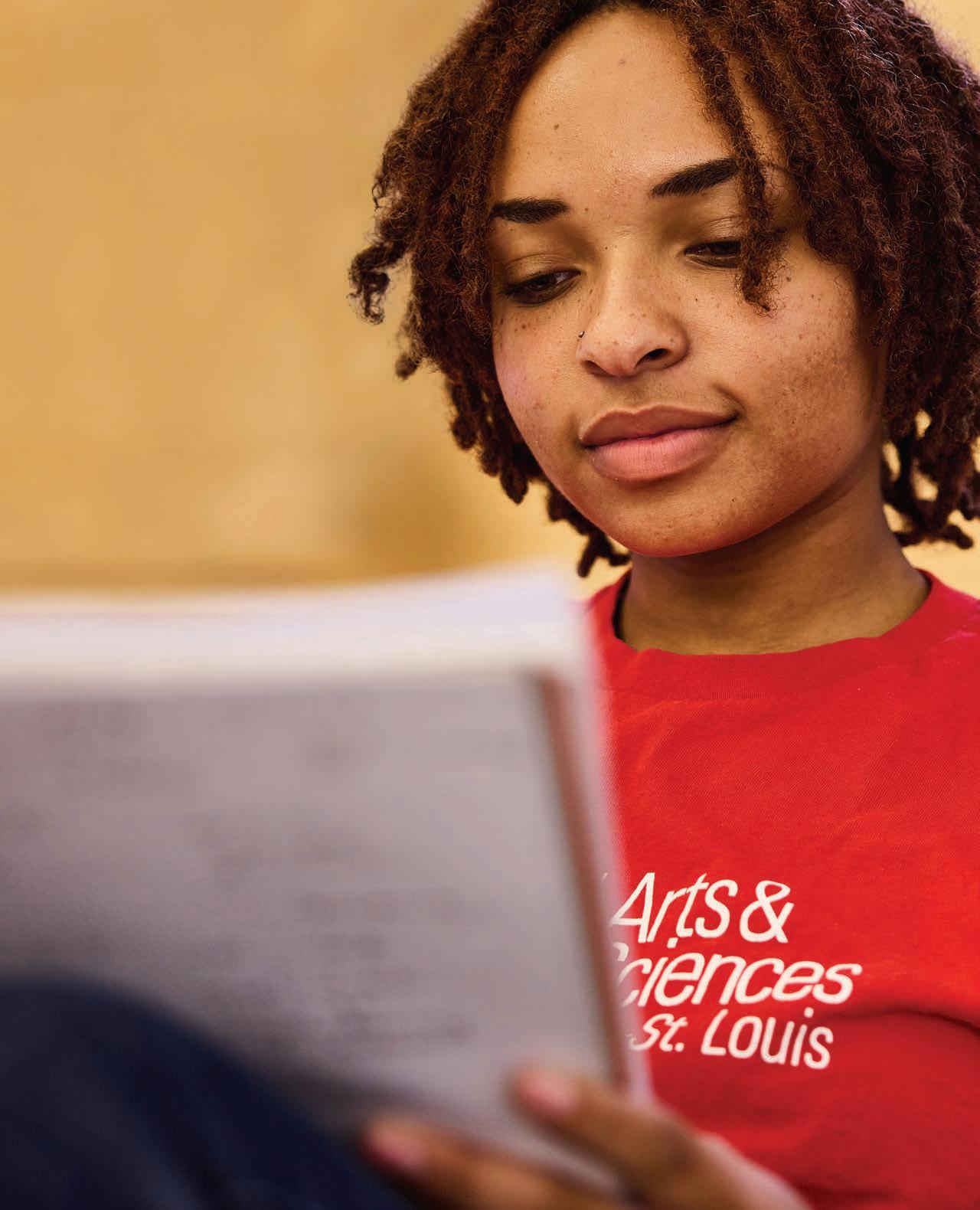
STUDENT-CENTRIC
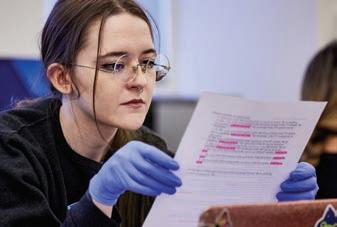
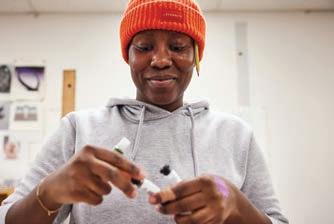
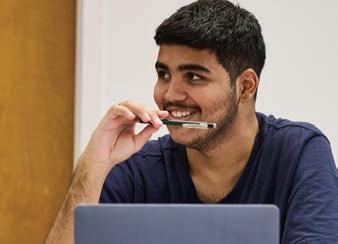
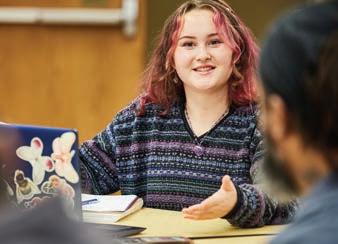
About the College of Arts and Sciences
The College of Arts and Sciences at the University of Missouri–St. Louis is the beating heart of the university. It is home to the greatest diversity of disciplines, the largest faculty and student body, and the most vibrant intellectual and creative life on campus. Together, we provide the essential foundation for students to discover, explore and transform their lives and positively impact their communities.
Our college is proudly student-centric, community-engaged and focused on interdisciplinary collaboration. These values shape everything we do. They shape the way we design our curricula, how we teach our classes, and how we advise and mentor our students. A College of Arts and Sciences education prepares students from all backgrounds to lead, collaborate and succeed in an increasingly complex and connected world.
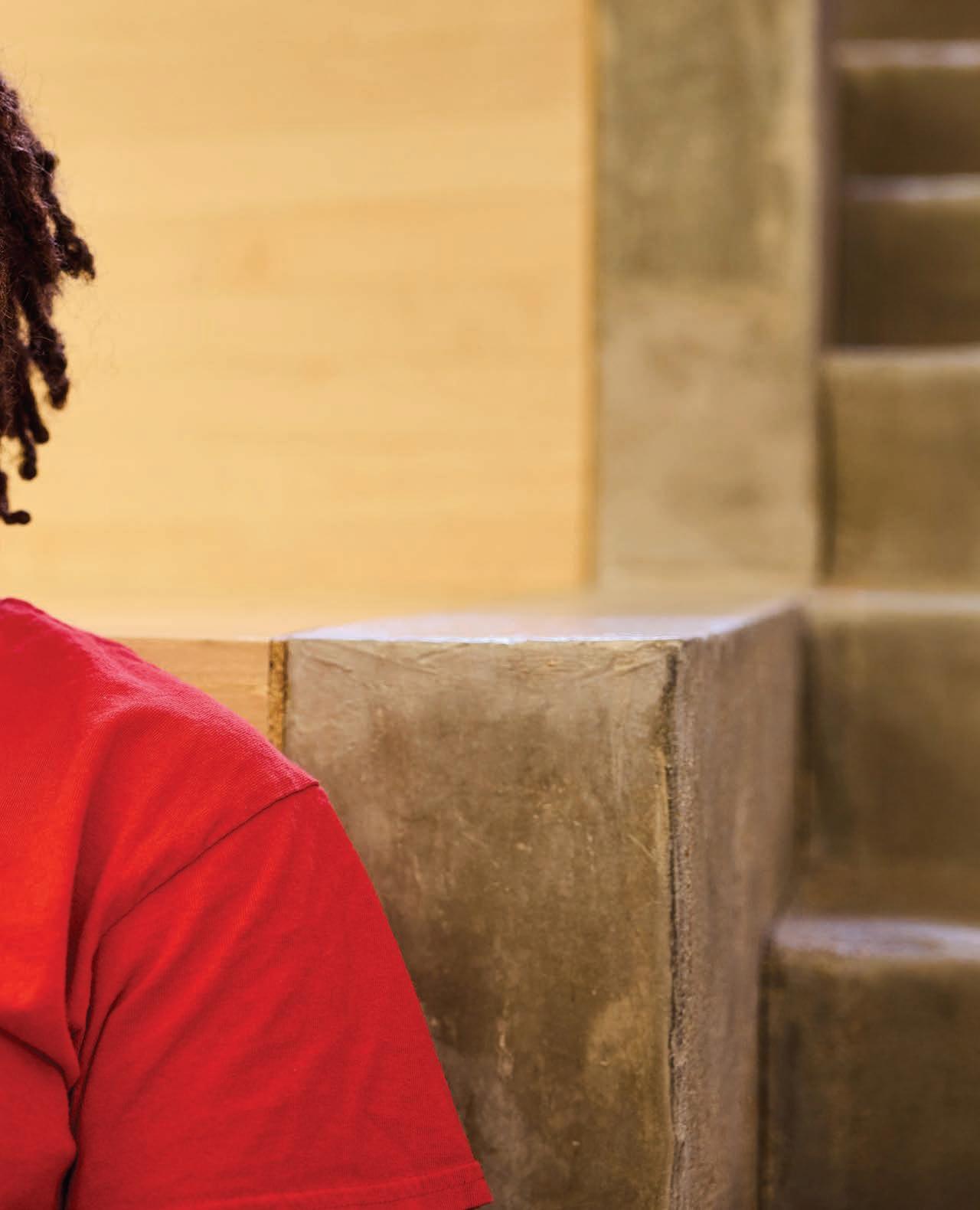
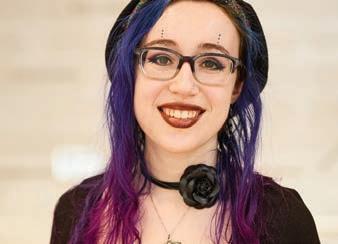
Departments and programs
With 16 departments and more than 70 undergraduate and graduate degree and certificate programs, the College of Arts and Sciences spans the full spectrum of the arts, humanities, social sciences and natural sciences.
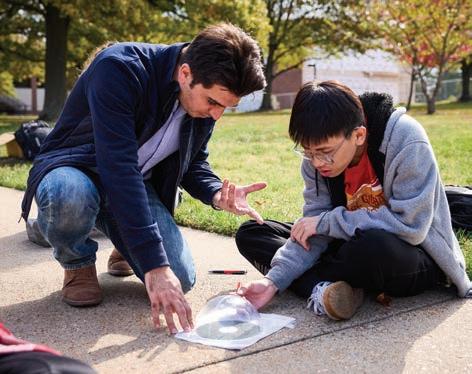
Natural Sciences and Mathematics
Biology, Chemistry and Biochemistry, Computer Science, Mathematics, Physics, Astronomy and Statistics WHERE DISCOVERY BEGINS — AND TRANSFORMATION TAKES HOLD
Humanities
Art and Design, English, History, Languages and Cultural Studies, Music, Philosophy
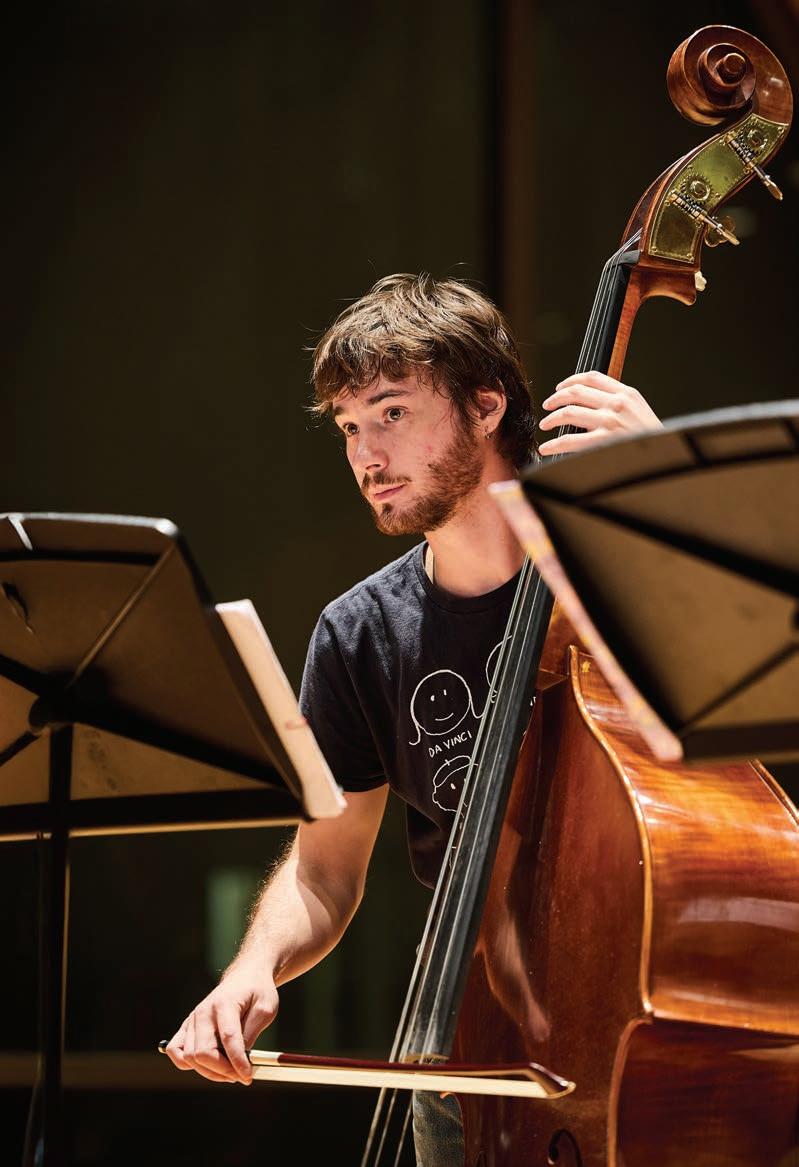
Social and Behavioral Sciences
Economics, Communication and Media, Criminology and Criminal Justice, Political Science, Psychological Sciences, Sociology
CAS IS KNOWN FOR ITS INNOVATIVE, INTEGRATIVE ACADEMIC OFFERINGS. IN ADDITION TO TRADITIONAL MAJORS, STUDENTS CAN PURSUE UNIQUE, INTEGRATIVE PROGRAMS IN AREAS.
INTERDISCIPLINARY BY DESIGN
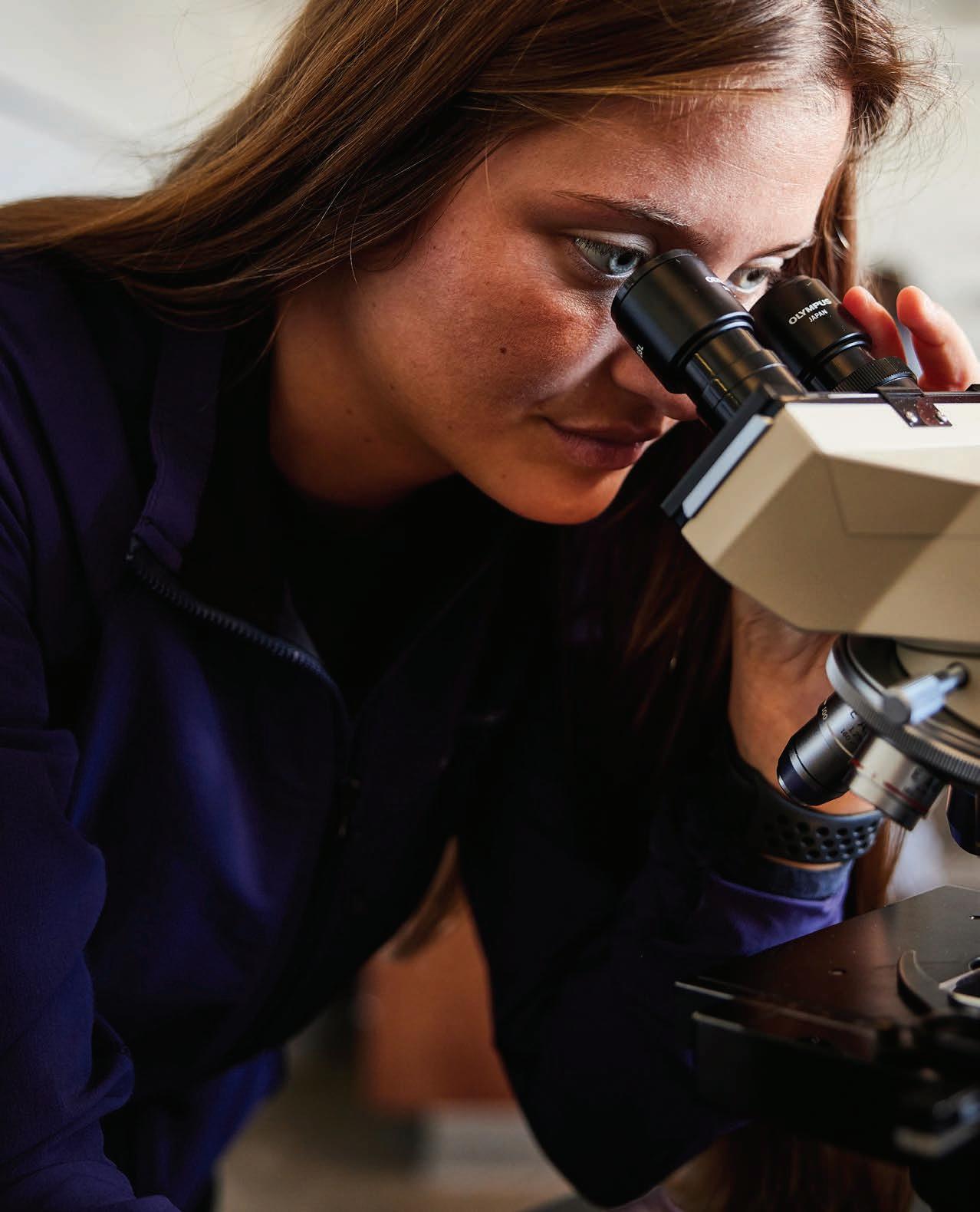
Actuarial Science
Jointly offered with Mathematics, Finance and Economics
Cybersecurity
Jointly offered with Computer Science and Information Systems
Data Science and Analysis
A program that blends statistics and computer science with applied analytics in a discipline of a student’s choice
Interdisciplinary Studies
For our most promising and innovative students, this program allows students to design a custom academic degree plan with the support of a faculty mentor
Liberal Studies
A program that allows students to merge two existing disciplines into a degree path that fits for the student
Organizational Leadership
A program for returning students with some college and deep experiences in the workforce
Guided by experts.
Our faculty are not only subject-matter experts but also committed educators and engaged public scholars. They teach and conduct research at the forefront of their disciplines, often in collaboration with local and regional partners. Our student-centric approach means small class sizes, accessible faculty, individualized advising and numerous opportunities for undergraduates to participate with their professors in research, fieldwork and creative projects.
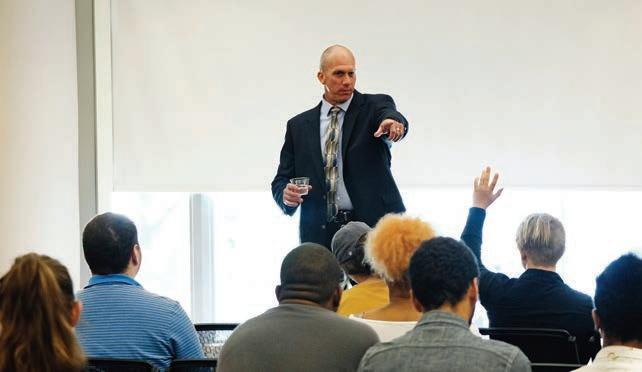
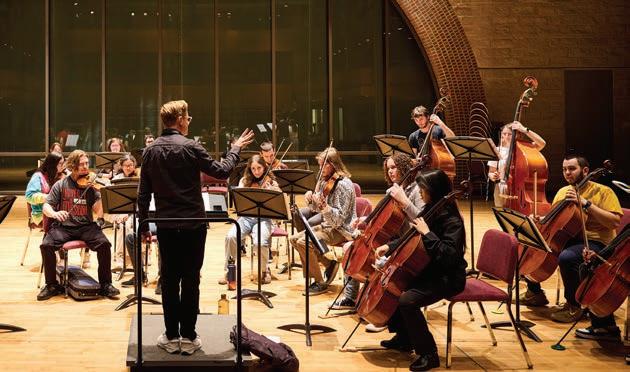
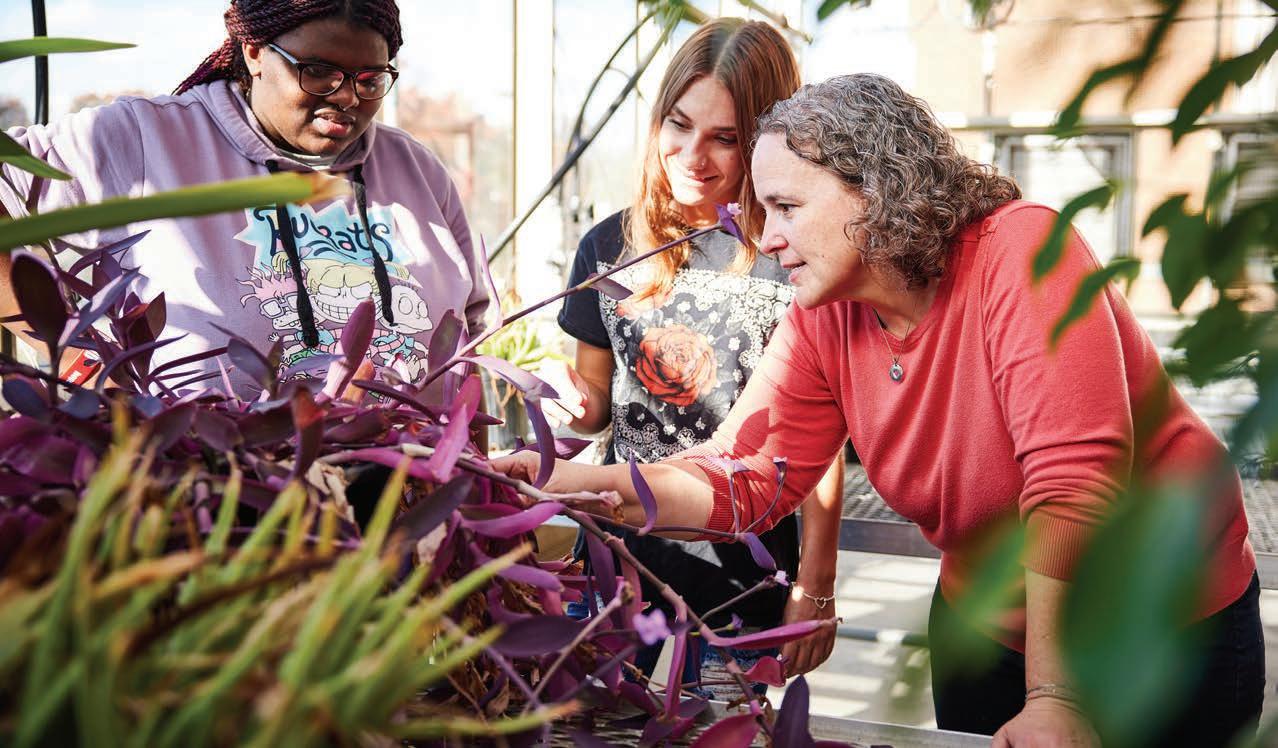
COMMUNITY-ENGAGED
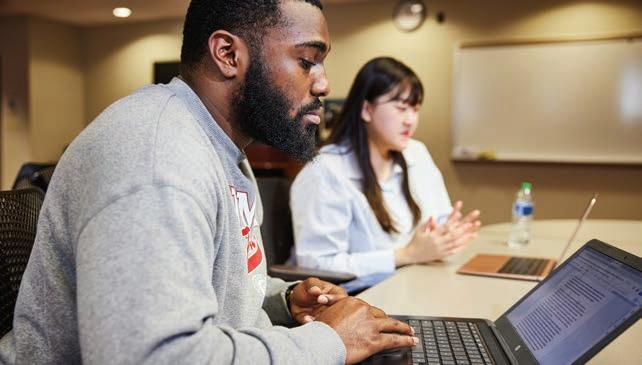
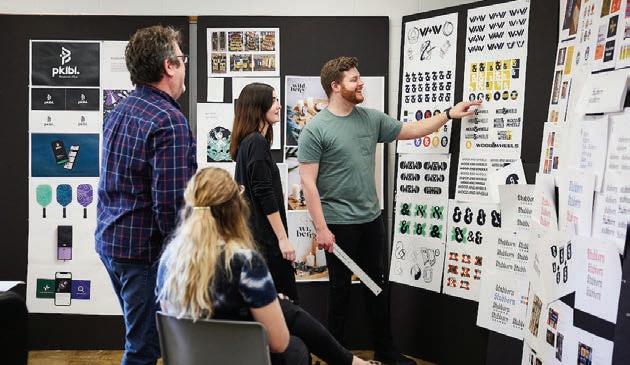
Criminology students
partnering with law enforcement and community organizations
Psychology students
working in clinical and counseling settings
Rooted in community.
CAS is also deeply community-engaged. Through partnerships with schools, nonprofits, businesses, cultural institutions and government agencies across the St. Louis region and beyond, our students connect theory to practice in real-world settings under the guidance of our faculty and staff. Whether through internships, service-learning, policy research or clinical placements, students apply their knowledge in ways that make an impact and build professional networks.
Sociology and Political Science students
analyzing policy issues affecting local communities
Arts, Design and Music students
contributing to the city’s rich arts and performance scene
THE COLLEGE OF ARTS AND SCIENCES IS MORE THAN AN ACADEMIC HOME — IT IS A LAUNCHPAD FOR TRANSFORMED LIVES.
Biology students
conducting conservation research with the Missouri Botanical Garden
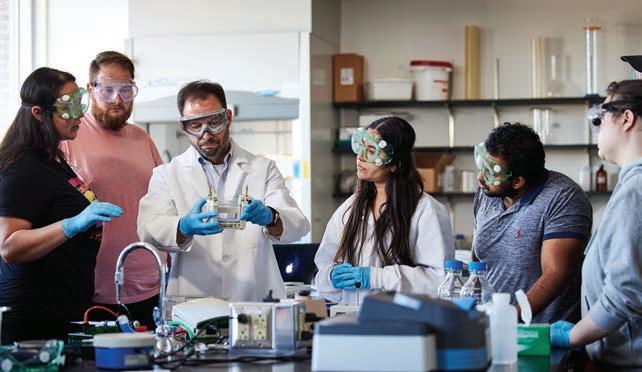
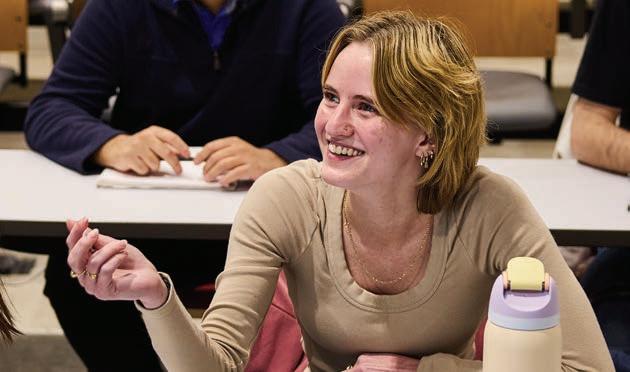
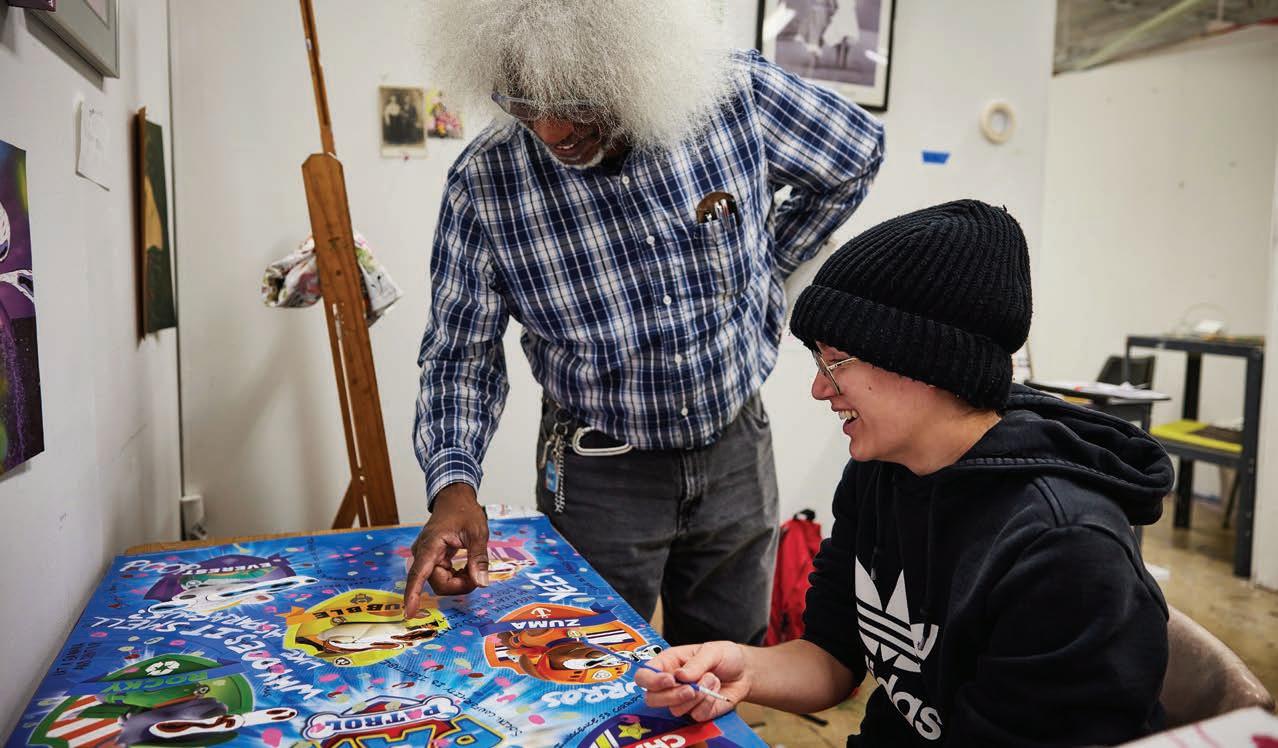
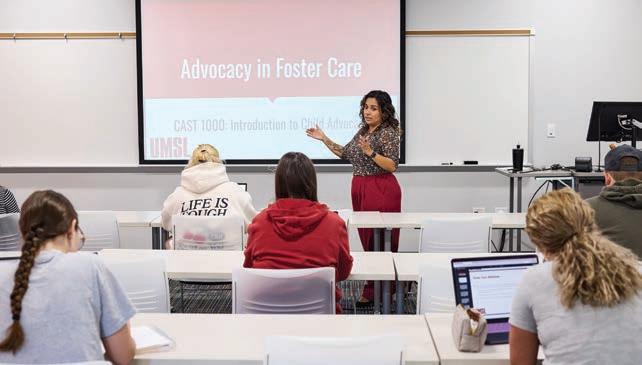
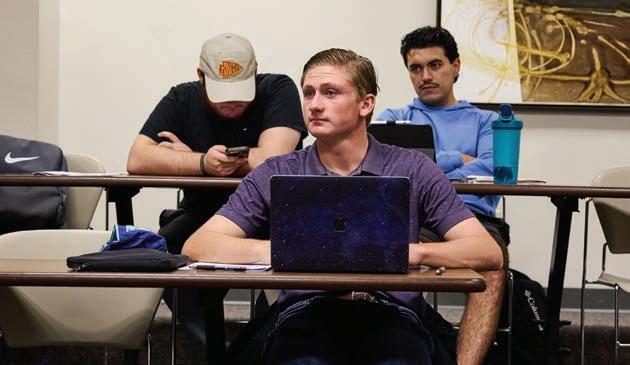
Mother-daughter bond inspires Makeba and Tanys Giles to tackle school together
For the past several years, Makeba Giles has been ready at every turn to help her children, Michael Dunlap and Tanys Giles, as they’ve worked toward degrees at the University of Missouri–St. Louis.
She’s been there to offer a ride to campus, send an encouraging text message or create an inspirational study playlist.
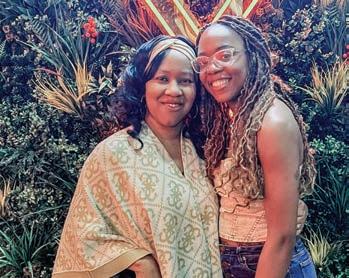

But now, she’s ready to see UMSL from a new perspective.
“I’m happy to not only be a Triton mom, but now I’m happy to be a Triton student,” she said with a laugh.
Makeba won’t be taking on this new challenge alone. Her daughter will be right alongside her. Tanys, who graduated from UMSL in 2023 with a bachelor’s degree in psychology and minor in child advocacy studies, has returned to the university to earn her MSW.
The pair said it feels special to embark on this journey together, and Tanys added that it’s been nice to have someone so close to empathize with during the first few weeks of the school year.
“It is very helpful,” Tanys said. “I text her all the time ... It’s really nice having that balance because, even in my bachelor’s program, she was very supportive. But now it’s really interesting to see that she can also see where I’m coming from in terms of assignments. Now, we can both go back and forth on the things that she’s doing well in her classes and things I’m doing well in my classes.”
In addition to supporting her children, Makeba has built a thriving business, Faith Health & Home, and that’s opened doors for her, too.
She has served as a Go Red Blogger Ambassador for the St. Louis chapter of the American Heart Association and traveled the country speaking at events hosted by prominent corporations such as Coca-Cola and Ford. She’s also been a member of the Aspen Institute’s Parent Advisory Panel, which is part of the organization’s National Commission on Social,
Emotional, and Academic Development; this experience in particular spurred Makeba to start thinking more about returning to school.
She had previous enrollment in other universities over the years, but recently, circumstances aligned making enrollment in an undergraduate program possible.
After witnessing her children’s personal and professional growth at UMSL, she knew it was the only choice for her own education.
Tanys, not to be outdone by her brother Michael who graduated with his bachelor’s degree in liberal studies in 2019, also threw herself into campus life.
She served as the president of the Associated Black Collegians and was a member of several clubs and organizations, including the Alpha Lambda Delta honor society, Delta Sigma Theta Sorority, Inc. and the Psychology Club. She was also part of the Pierre Laclede Honors College and worked at the Recreation and Wellness Center.
After graduation, Tanys began working as a therapeutic teacher at FamilyForward, a nonprofit that delivers comprehensive therapeutic and educational services to children affected by trauma. Two of her coworkers happened to be UMSL MSW graduates.
“They were the ones who convinced me to switch over to social work and then to go back to UMSL to get my social work degree, because they said the program was great,” Tanys said. “They just talked so highly of the program at UMSL.”
“I can tell you firsthand, just seeing how inviting, how much of a family and how close-knit the community is on the UMSL campus, that helped my son a lot,” Makeba said. “It helped him to graduate with his bachelor’s, and the same thing with Tanys. I’m totally sure that’s what helped her get through the bachelor’s degree, and it will definitely help her get through the master’s degree.”
Makeba added that there’s one thing she knows will help her get through the communication program –her daughter.
“I have to keep going because she’s looking at me,” Makeba said. “She’s watching me, and I want to motivate her. It’s really from the heart. I want to make her proud of me. I want to be the inspiration to keep going for her that she is for me.”
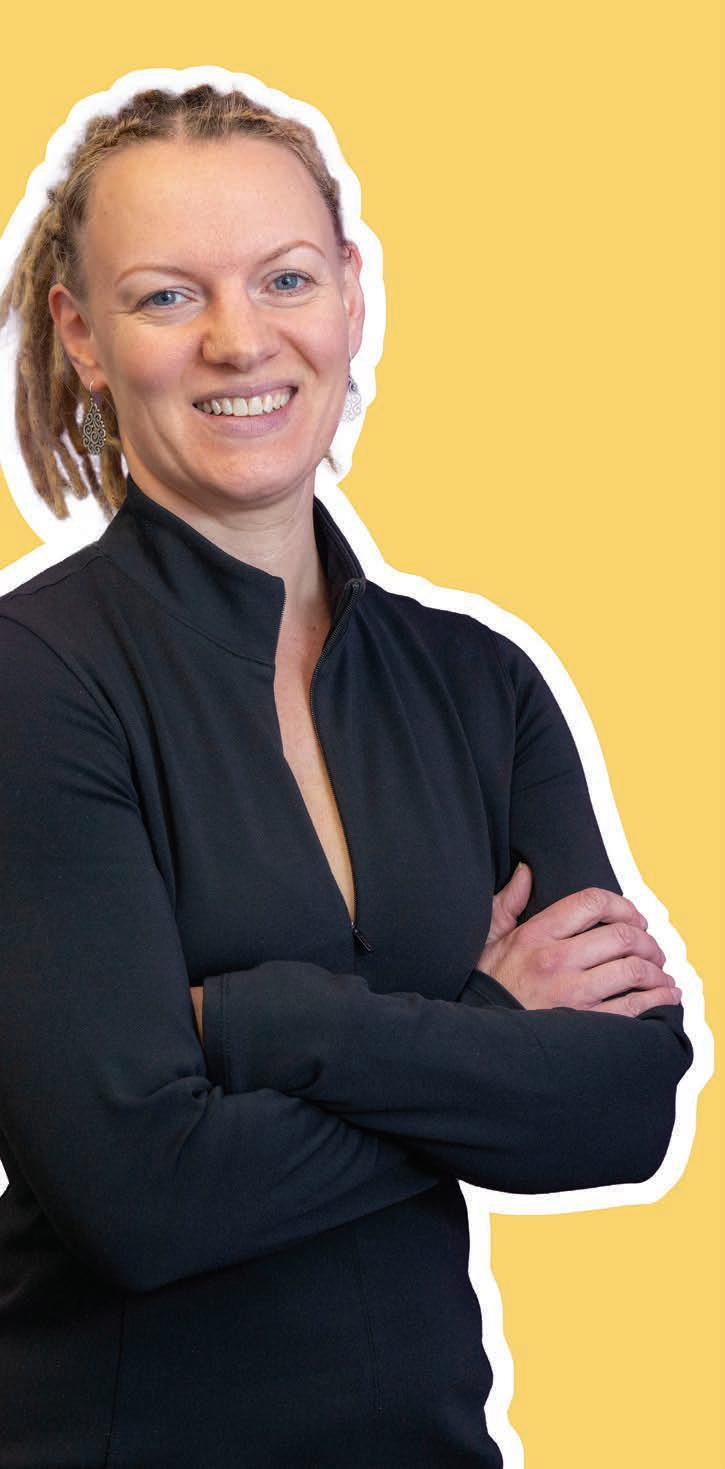
Associate Professor Sandra Langeslag explains science of love in Pittsburgh Post-Gazette story
Is love in the air? Associate Professor Sandra Langeslag of the University of Missouri–St. Louis was featured in the Pittsburgh Post-Gazette for her groundbreaking research on the neuroscience of romantic love. A faculty member in the Department of Psychological Sciences, Langeslag has spent nearly two decades studying how love affects memory, attention and cognition.
“When you are in love with someone, then that person becomes a very emotional stimulus to you, not to other people,” Langeslag told writer Allie Miller. “To other people it’s just a random person, but to you, they become very special.”
Her research has earned national attention for its innovative use of brain imaging and cognitive testing to explore how love influences the brain. In her studies, participants are shown photos of their romantic partners, friends, and attractive strangers. Brain wave measurements consistently show stronger responses to images of loved ones, revealing how deeply love is wired into our cognitive systems.
Langeslag’s work also explores how romantic love differs from other forms of affection, such as the love felt for friends or family. She explains that evolution has shaped romantic love to serve a unique purpose in human bonding and reproduction.
Her research has not only advanced scientific understanding but also brought UMSL into the national conversation on emotional and cognitive health. The Post-Gazette feature is just the latest example of how her work resonates beyond academia.
Langeslag’s recognition reflects the strength of UMSL’s research community and its commitment to exploring complex human experiences. As an associate professor and associate chair of her department, she also mentors students in conducting original research, helping them develop skills in experimental design, data analysis, and neuroscience.


Her studies have practical implications, too.
By understanding how love affects attention and memory, researchers can better grasp how emotions influence decision-making, learning, and even mental health.
Langeslag’s national media presence underscores the relevance of her work and the growing interest in the science behind love and relationships. Her ability to translate complex neuroscience into accessible insights makes her a valuable voice in both academic and public discourse.
UMSL criminologists Chris Sullivan, Lee Slocum contributing expertise in research, data collection to Save Lives Now! initiative
Save Lives Now! is a regional initiative aiming to reduce violent street crime in the St. Louis area by 20% over the next three years.
In March 2025, elected officials, law enforcement, and community leaders gathered at the University of Missouri–St. Louis for an Advisory Council meeting to discuss the initiative’s progress.
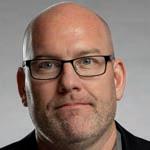
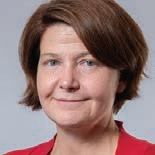
“There are some wonderful people doing wonderful work in the room,” said Director Brandon Sterling, addressing attendees including St. Louis County Executive Dr. Sam Page and then-St. Louis Mayor Tishaura Jones.
Among the participants were UMSL criminologists Chris Sullivan and Lee Slocum, who are contributing their expertise in research and data collection. Both faculty members from the Department of Criminology and Criminal Justice are part of the initiative’s implementation team, led by the East-West Gateway Council of Governments.
Next month, the initiative will launch a pilot program in the city, serving 40 individuals at high risk of becoming offenders. The strategy combines focused deterrence, cognitive behavior theory and street
outreach. Plans are in place to expand to 45 more participants in St. Louis County and St. Clair County, Illinois, with a goal of reaching 500 individuals region-wide.
Sullivan and Slocum will evaluate the program’s effectiveness over the next three years.
“Chris and Lee are incredible resources to the Save Lives Now! regional anti-violence initiative,” said Jim Wild, executive director of East-West Gateway Council of Governments. “They have dedicated countless hours of their time helping East-West Gateway’s research department and partners crunch and present data on violent street crime in our region.
“We see both of them leading evaluation efforts to ensure Save Lives Now! strategies are being delivered with fidelity and results are being properly measured and documented. This type of oversight will help the initiative make any needed course corrections and also ensure that the work being done is truly reducing shootings and homicides. We are so deeply grateful to them and to UMSL for the ongoing partnership. This demonstrates the true power of collaborating across jurisdictions for regional gain.”
The initiative traces its roots to a 2023 crime summit led by Thomas Abt, founding director of the Center for the Study and Practice of Violence Reduction.
A follow-up practicum the following December helped shape the regional strategy. Slocum and Sullivan joined the effort after the late Richard Rosenfeld, a Curators’ Distinguished Professor Emeritus at UMSL, stepped away due to illness.
Their work aligns with a $779,614 grant from the National Institute of Justice for a project titled “Understanding and Refining Violence Intervention Implementation: St. Louis, MO as a Crucial Case.”
“The funding that we received was predicated in part on us being more dynamic in reporting to practitioners in the field and community stakeholders,” Sullivan said.
UMSL’s involvement reflects its broader mission.
“We’re a very community-engaged institution,” Slocum said. “I think it’s important to be involved here. You get to learn what other people are doing out in the community, and I like that. I like being able to learn what’s happening in local organizations and seeing all the work that they’re doing.
UMSL YouthMappers helps foster interest and develop skills in geospatial technology
Torin Hovander wasn’t expecting such a large turnout for the Off-Ramp Speaker Series event hosted by the University of Missouri–St. Louis chapter of YouthMappers. Held in the Geospatial Advanced Technology Lab in Benton Hall, the event drew so many students that Hovander had to find extra chairs to accommodate the crowd.
The students came to hear from Keith Barber, director of strategies and engagements at BAE Systems Electronic Systems, and retired Vice Admiral Robert Sharp, former director of the National Geospatial-Intelligence Agency and now a research fellow with UMSL’s Geospatial Collaborative. Sharp even remarked on the standingroom-only attendance in his opening comments.
UMSL’s YouthMappers chapter, founded last spring by students Samantha Dobson and Hovander, is part of a global network of more than 400 student-run chapters. The organization’s mission is to “organize, collaborate, and implement mapping activities that respond to actual development needs around the globe – creating and using spatial data and information that is made publicly available through open platforms.”
applications and professional networks. The Off-Ramp Speaker Series, created by the chapter, brings students face-to-face with industry leaders and experts in geospatial technology, offering insights into career paths and innovations in the field.
The chapter’s work reflects UMSL’s broader mission as a community-engaged institution. Through YouthMappers, students are not only building technical expertise but also contributing to global humanitarian efforts and local community resilience.
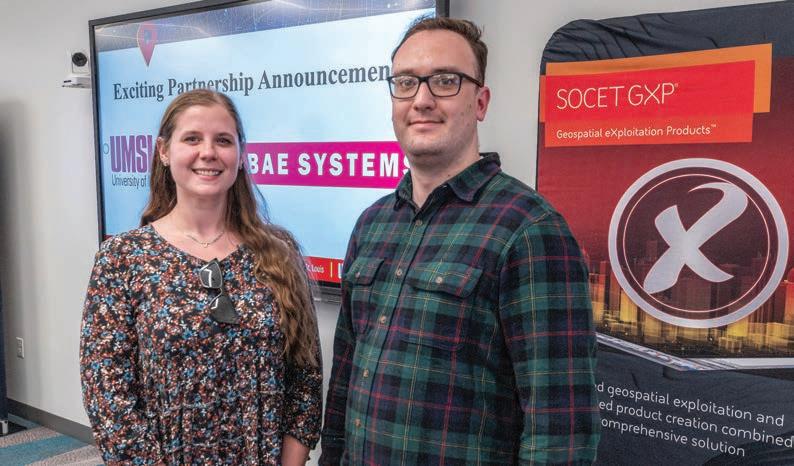
“We are a humanitarian mapping organization, and what that means is that a lot of the work we do is in developing countries that really can’t afford to create their own maps,” Hovander said. He pointed to maps created to assess wildfire damage in Los Angeles as an example of the kind of data that can be critical in disaster response. It is the kind of critical data that many countries lack the resources to produce.
UMSL YouthMappers is helping students develop valuable skills in geographic information systems (GIS) while also connecting them with real-world

Reda Amer, the director of UMSL’s Geospatial Collaborative, has been very supportive of YouthMappers activities, ensuring they have access to the lab when they need it. Recently, they have helped map the impact of flooding in Malawi and contributed to an assessment of volcano damage in the Philippines.
“There really is no typical project,” Hovander said. There are opportunities to contribute to projects all over the world, and students can choose ones that align with their interests.
The idea to launch a YouthMappers chapter at UMSL originated from a conversation that Amer had with the organization’s membership coordinator at the Geography 2050 STL symposium that UMSL hosted
EXCELLENCE IN ACTION
CONTINUED
with the American Geographical Society in June 2023. He wound up engaging computer science Professor Sanjiv Bhatia and former Professor of Practice and current NGA staff member Jessie Bleile, who was teaching a course for the geospatial certificate program that fall.
Hovander and Dobson were two of the students in Bleile’s class, and when they heard about YouthMappers, they jumped at the chance to get involved. They have served as the president and vice president since its inception while Bhatia has been the group’s faculty advisor.
“You use mapping for all kinds of things – tracking any kind of data or trend, optimizing routes or resource allocation,” Dobson said. “Then you can get into remote sensing and all these different associated technologies. Mapping is a very practical tool that is used in every sector.”
“Academia and industry working together supports our next-generation innovators who will solve the world’s toughest problems,” Barber said during the event. “These geospatial technologies are really adaptive and can be used in so many ways, but they only become more adaptive when you get them in the hands of young minds early.”
UMSL’s growing presence in the geospatial ecosystem is further supported by partnerships like the one with BAE Systems, which provides students with access to advanced software, training, and internship opportunities. These collaborations enhance the university’s role in preparing students for careers in a rapidly evolving field.
Bhatia believes the organization can get even bigger; however, Hovander finished his certificate program in December 2024 and Dobson and Student Government Association representative Rumandeep Singh graduated in the spring. So, Bhatia knows he is going to have to find new students who share their passion for GIS and can build on the foundation they set.

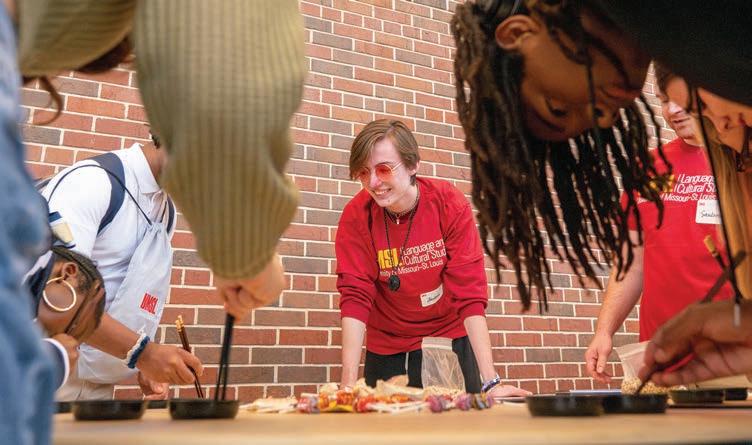
“They are the ones who are running the show,” Bhatia said. “We are going to need some more fresh blood who are excited about this and will continue to do their work.”
UMSL language students give back at World Languages Day celebration after participating as high schoolers
The Blanche M. Touhill Performing Arts Center was buzzing with energy as more than 500 high school students from across the St. Louis region gathered for the University of Missouri–St. Louis in late September 2024. It was all thanks to the fifth annual World Languages Day celebration. The event, hosted by the Department of Language and Cultural Studies, offered students a vibrant introduction to global cultures and languages and a glimpse into life at UMSL.
“The goal is to get them not only using the language that they’re studying in their respective high schools but also to expose them to other languages and cultures,” said Sandra Trapani, teaching professor of French and chair of the department.
The event featured a variety of interactive activities, including a scavenger hunt, a digital skit competition, and the popular “Lingolympics,” where students
tested their skills in language-themed games. One such challenge involved using chopsticks to move dried beans from one cup to another in under a minute.
UMSL students, many of whom had once attended as high schoolers themselves, played a central role in volunteering and running the event. Their return as volunteers underscores the event’s lasting impact and the department’s strong ties to local schools.
Jackson Clutts, now a freshman majoring in Japanese, first attended World Languages Day two years ago as a French student at Marquette High School. He recalled being captivated by a Japanese poetry reading and meeting Associate Teaching Professor Hiroko Yoshii, who would later become his instructor.
“Looking back on it, it was an important day,” Clutts said. “For one thing, it showed me UMSL. I was like, ‘Honestly, this place has the best language courses. Hey, I think I’ll come here.’ And I knew the campus from coming to UMSL that day, so it wasn’t like some alien place.”
Audrey Stuvland, a freshman majoring in French, had a similar experience. She attended the event as a Ritenour High School student and remembered the excitement of learning to write her name in Mandarin and participating in the skit competition.
“It was really fun,” she said. “Not only was I excited to get out of high school, but it was really nice being around people who also liked language and wanted to go to college. I really liked learning about different cultures.”
Now, both Clutts and Stuvland are giving back by helping the next generation of language learners feel welcome and inspired. Their stories reflect the department’s commitment to fostering a love of
languages and building bridges between UMSL and the broader community.
Through World Languages Day, UMSL continues to serve as a hub for cultural exchange and educational opportunity; high school students become college ambassadors and language learning becomes a lifelong journey.
May sociology graduate Triniti West explores passions for community and public policy
Triniti West began her college career as a biology major, but as her education progressed, she realized it was the philosophical side of science that truly piqued her interest.
West graduated from the Young Women’s College Preparatory Academy in her hometown of Houston in 2019, and then enrolled at Colgate University, a private liberal arts college in upstate New York. However, unhappy with her course of study in biology, West left the university in 2022 and moved to Ohio for a full-time job with a public health agency. A job with
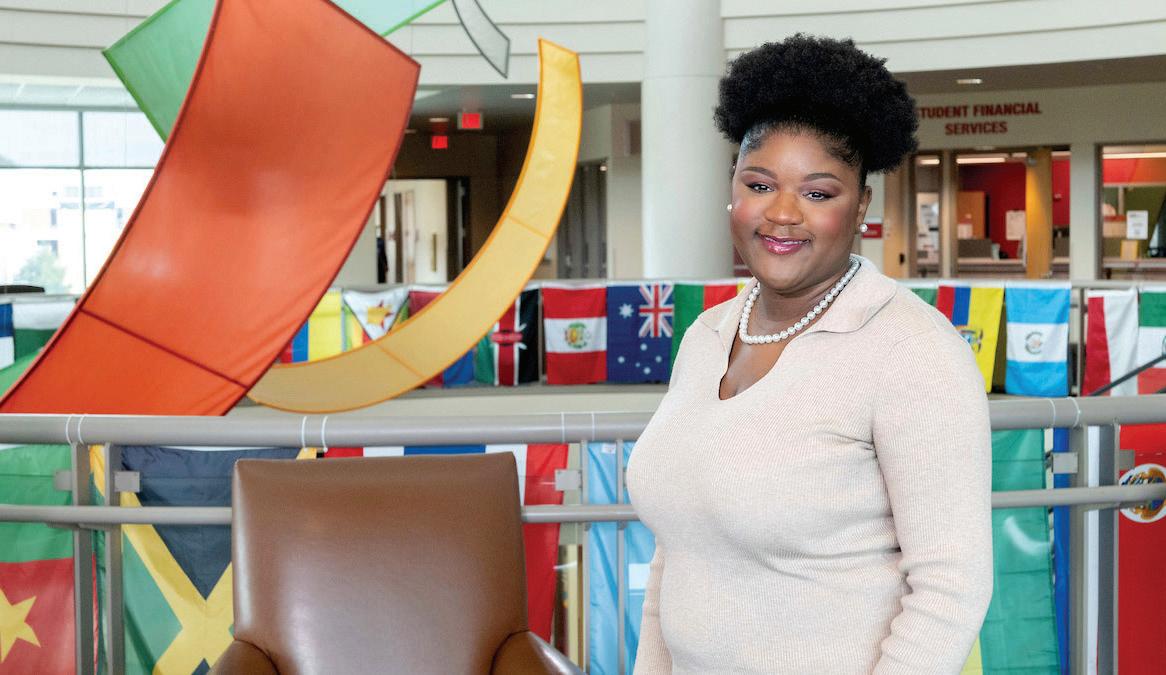

EXCELLENCE IN ACTION

CONTINUED
Allsup, a firm specializing in disability claim services, brought her to the St. Louis region in 2023.
After transferring to UMSL, she found her academic home in the Department of Sociology
“When I transferred to UMSL I was like, ‘I’m gonna choose something that will allow me to be creative, allow me to do what I love,’” she said. “I love to write. I love to research. Sociology felt like the best subject that would allow me to do that.”
UMSL provided the flexibility West needed to work full-time while going to school, and she found the sociology faculty members, and the university in general, to be incredibly welcoming.
West has excelled in her coursework, developing a strong interest in public policy issues such as housing and municipal fragmentation. Her academic work has been complemented by real-world engagement, including a panel discussion with local legislators this past March. This opportunity helped her connect classroom theory with community impact.
“Sociology can feel a little intimidating because it’s a bunch of theory, and you’re learning the ideas of folks who you’ve never met and will never meet,” West said. “But your professors make it engaging in a way where you feel like your opinion on these things matters, and you get to share your perspective.”
Her scholarly achievements are matched by her leadership on campus. West serves as president of the Associated Black Collegians and has contributed to numerous university initiatives, including the 2025 Homecoming Planning Committee and the University Program Board. She also worked at the University Tutoring Center, supporting fellow students in their academic success.
Now, as she prepares for the next chapter, West is considering graduate programs in public policy administration or law school. These are fields where her research skills, policy insight, and passion for equity will undoubtedly shine.
“It’s been one of the greatest experiences,” she said. “So, I’ll be sad to leave UMSL, but I definitely feel like I got the best experience out of my time that I could have gotten.”
Physics graduate Keith Reece finds personal, professional growth conducting comet research
Keith Reece’s academic journey into physics began with a simple click of fate: turning to the Science Channel. Watching the channel sparked a fascination that would eventually lead Reece to the University of Missouri–St. Louis to pursue his bachelor’s degree in physics.
“I remember I saw Michio Kaku – a theoretical physicist who’s a really big string theory guy – and I thought his job was just the coolest thing ever. There was a little chyron [a digital graphic] that said ‘Michio Kaku – physicist.’ That’s what really got me into physics.”
At UMSL, Reece came into his own as a scientist. He spent several semesters conducting comet spectroscopy research under the guidance of Professor Erika Gibb and Assistant Professor Mohi Saki. Their work, utilizing the NASA Infrared Telescope Facility, has contributed to the broader scientific understanding of cometary composition and behavior.
Reece’s involvement in this research not only deepened his academic experience but also positioned him for future success in graduate school. His work has drawn attention beyond campus, reflecting the caliber of research opportunities available at UMSL.
“There’s so much physics outside of astronomy,” Reece said. “I feel like I have barely dipped my toes into solid state physics, nuclear physics, particle physics, atmospheric physics, fluid dynamics. There are all kinds of things that I barely know anything about. So, I think I would like to investigate those fields, too.”
Reece’s scientific curiosity was evident from a young age. He taught himself to read using a paleontology encyclopedia and spent hours watching “Dexter’s Laboratory.” In high school at McCluer North in Florissant, Missouri, his innate curiosity stood out. His physics teacher, Deborah Trafford, handed him a college-level textbook to satisfy his relentless questions. He could hardly comprehend a full sentence of the advanced physics, but that only served as motivation.
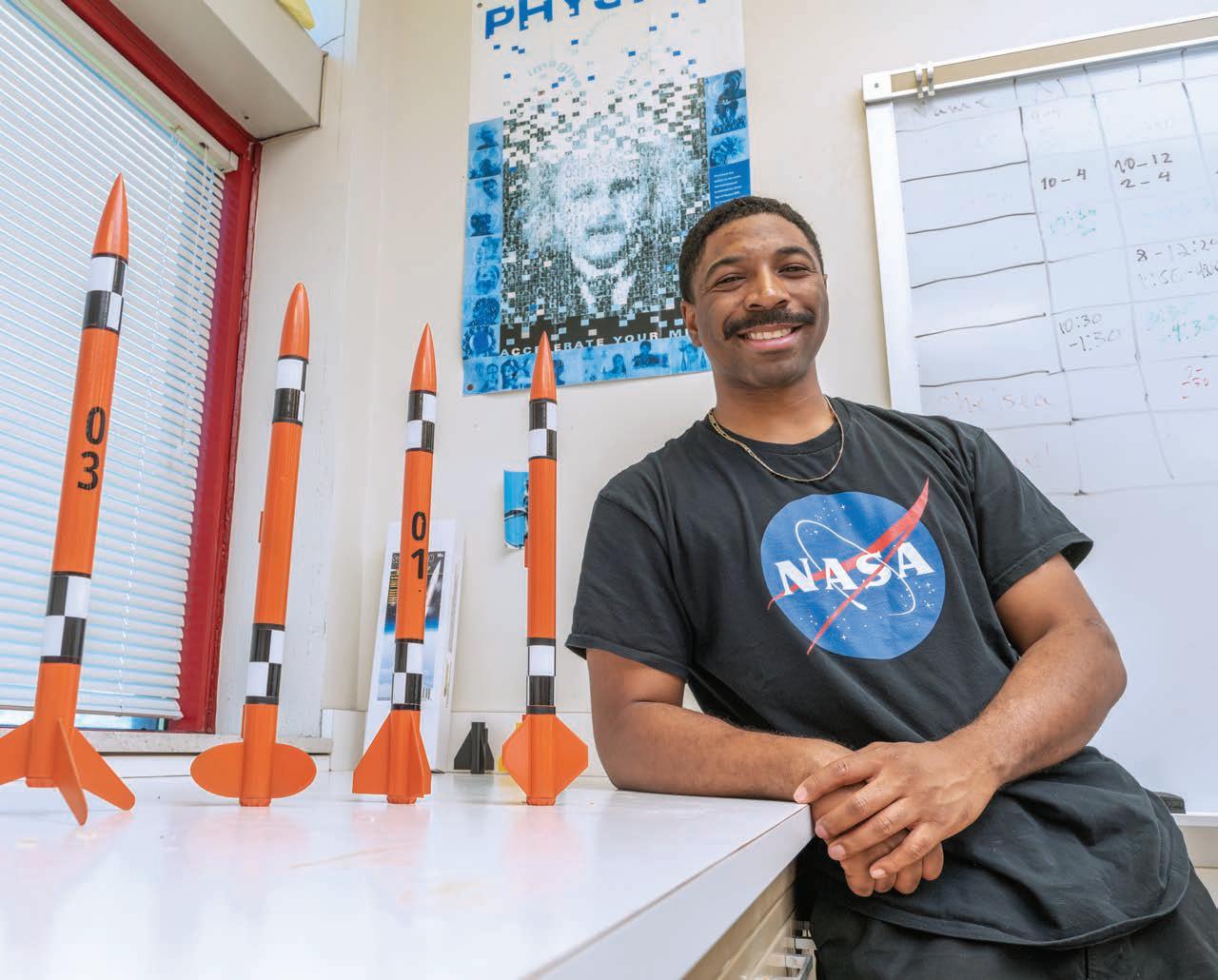
“It really, really made me want to learn more about it,” he said.
After initially enrolling at the University of Missouri–Columbia, Reece faced health challenges that led him to withdraw. He later resumed his studies at Missouri S&T before transferring to UMSL, where he found a supportive environment and opportunities to thrive.
Outside the classroom, Reece has pursued his passion for rocketry with the St. Louis Rocketry Association. He’s built and launched rockets in his free time, combining hands-on experimentation with his academic interests.

Reece’s story is a testament to resilience, intellectual curiosity and the power of mentorship. His research contributions and growing recognition underscore UMSL’s role in fostering student success and advancing scientific discovery.
As he prepares for graduate school, Reece remains eager to explore new frontiers in physics. Whether studying comets or launching rockets, he embodies the spirit of inquiry that defines the next generation of scientists.
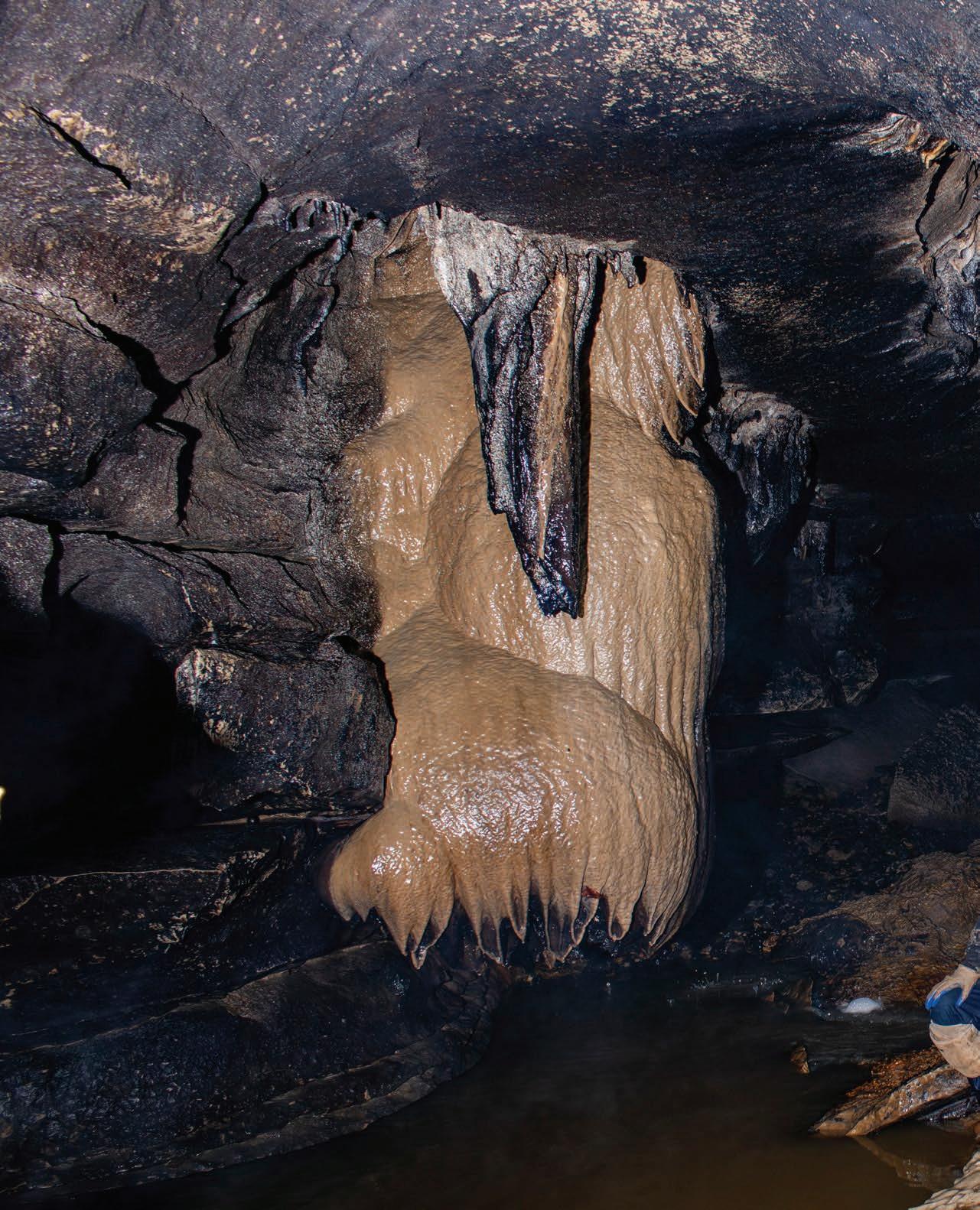
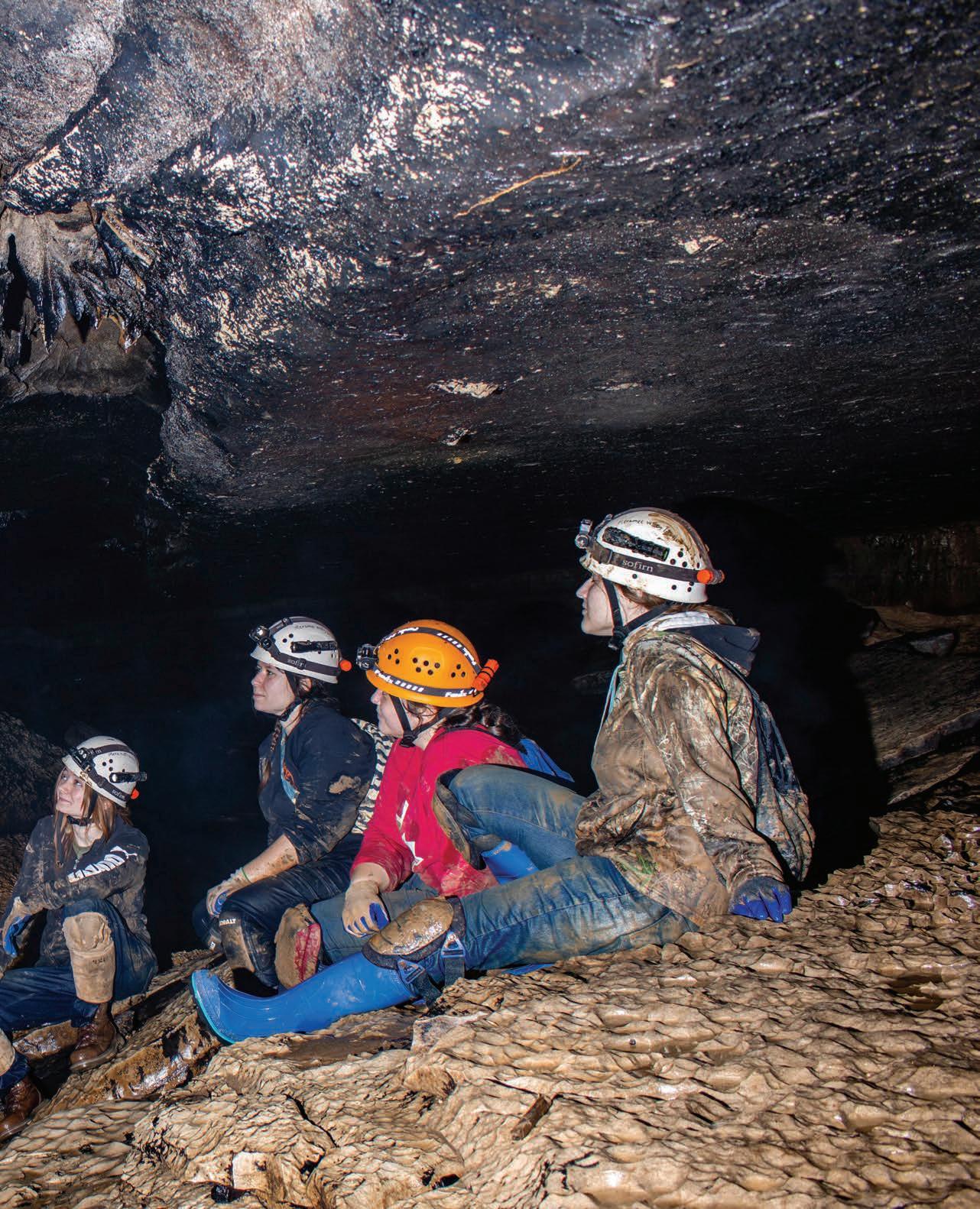
Eye on UMSL: Cave Exploring
The University of Missouri-St. Louis’ Environmental Adventure Organization hosted a trip to a cave in Southern Illinois during spring break. The trip included UMSL students Emma Landwehr, a sophomore biochemistry and biotechnology major; Sophia Spaulding, a senior biology major; Andersen Patty-G’Sell, a junior biology major; and Jenn Voss, a senior liberal studies major. During the expedition, the students paused to examine a speleothem.
The EAO participates in a variety of adventures throughout the year including hiking, picnics, ice skating, bonfires and camping. The EAO also participates in several environmentally conscious projects including clothing swaps, up-cycling workshops, Arbor Day tree planting, seed swap, invasive species removal and community gardening.
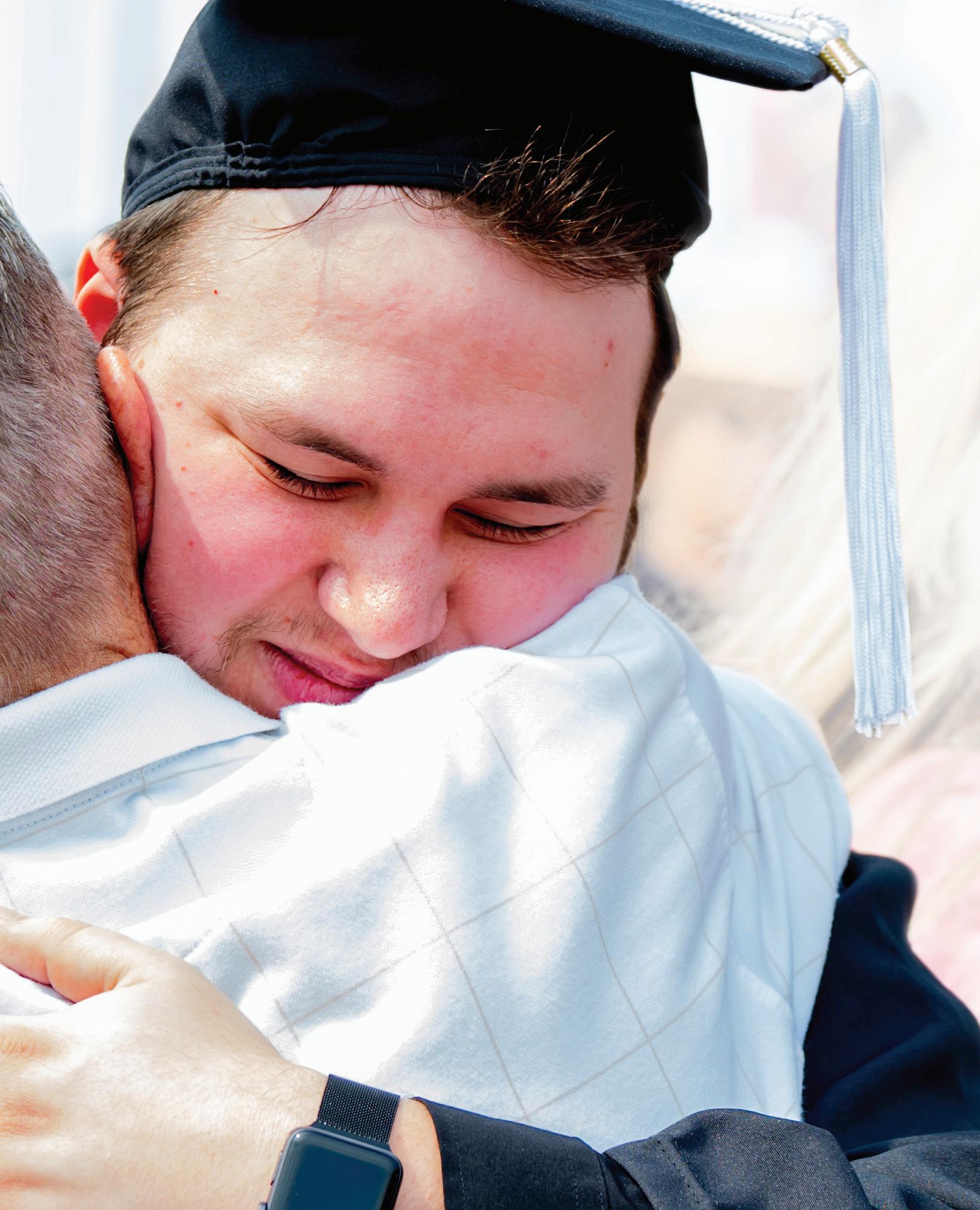
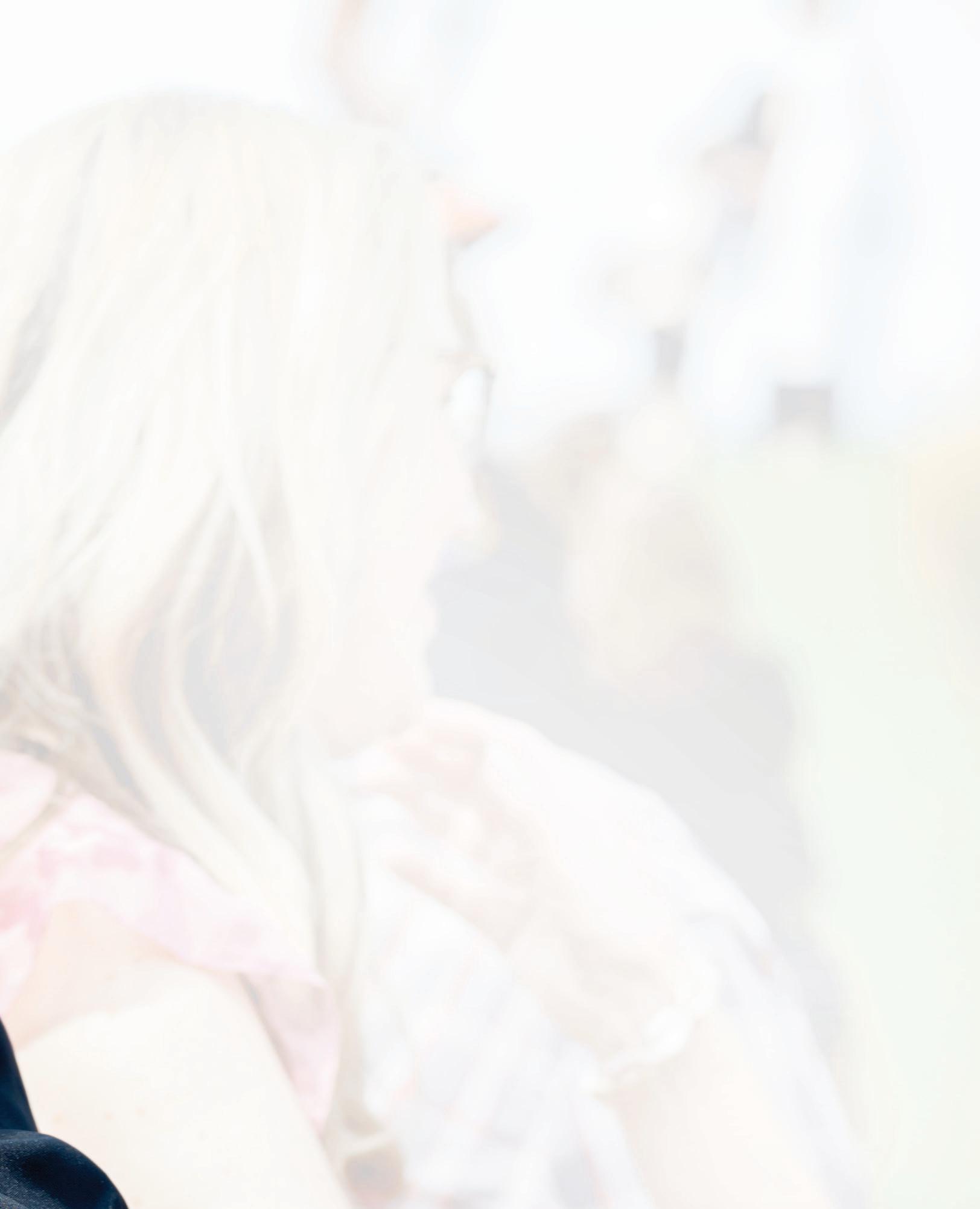
Fuel Discovery. Empower Transformation.
When you support the College of Arts and Sciences at the University of Missouri–St. Louis, you’re investing in more than just education — you’re helping students from all backgrounds unlock their potential and make meaningful contributions to the world.
From scholarships and undergraduate research to community partnerships and faculty excellence, your gift strengthens the very core of UMSL’s mission: to transform lives through access, opportunity and academic excellence.
Whether you’re a proud alumnus, a friend of the college or someone who believes in the power of public education — we invite you to join us in shaping what’s next.
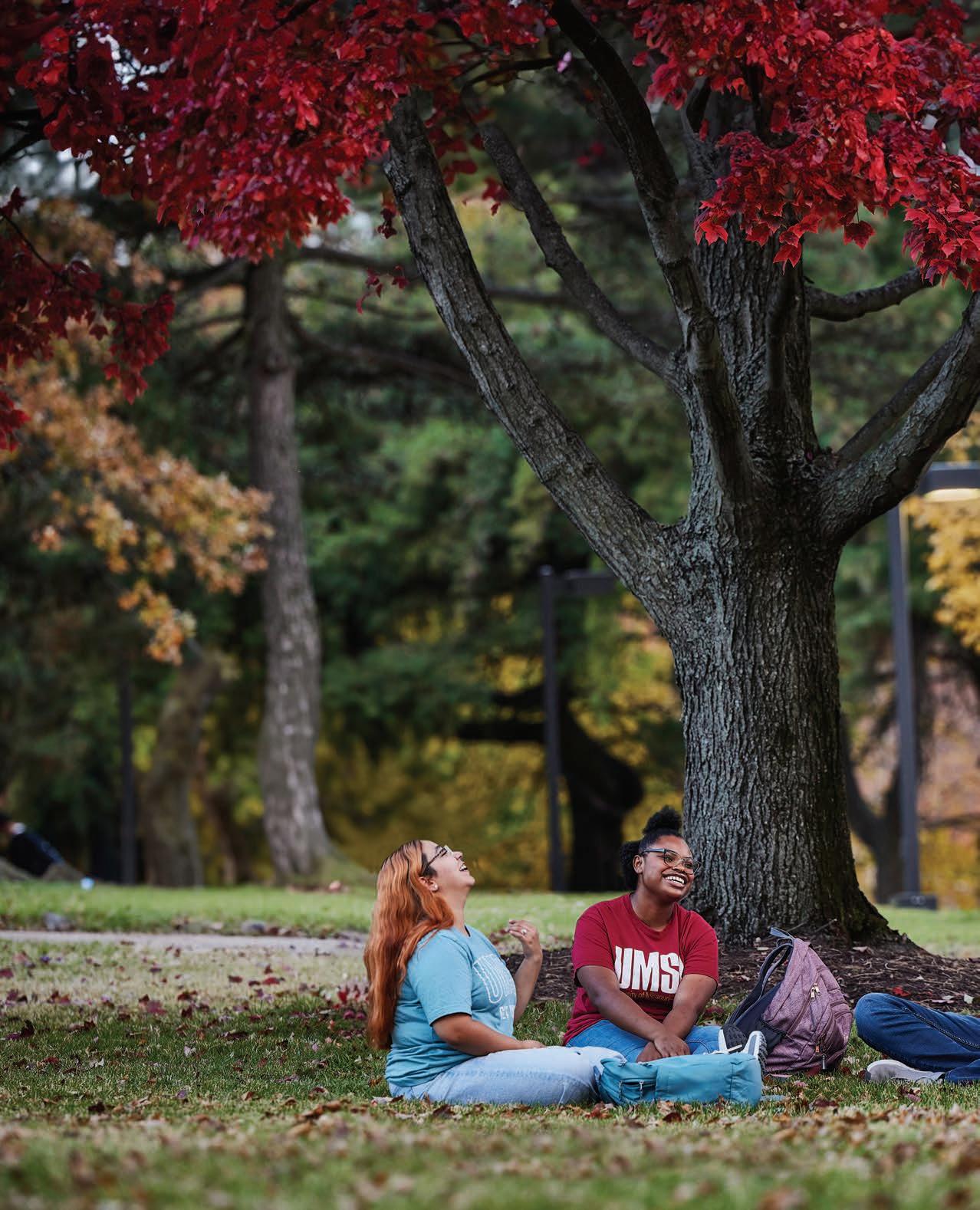
LEARN MORE ABOUT CAS
